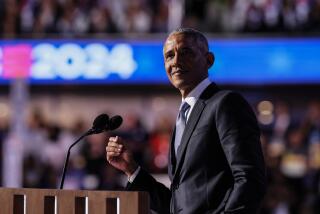NEWS ANALYSIS : Clinton Will Seek to Bring High Hopes Down to Earth : Presidency: The challenge is to attack problems in realistic terms without disappointing his constituency.
WASHINGTON — Bill Clinton, his Cabinet finally chosen and public support climbing, will sweep into Washington next month on a post-election surge of public optimism that--finally--something will be done about joblessness, chronic social ills and America’s declining position in the world economy.
Like Franklin D. Roosevelt in 1933 and other chief executives who took office at a time of acute anxiety about the future, however, Clinton now confronts one of the most difficult challenges a President can face: How to bring the soaring hopes of a troubled people down to Earth without losing their support?
And the American people, while telling pollsters that their view of the future is brighter than it has been in several years, instinctively understand that a new Administration cannot work instant miracles.
“Maybe he did promise too much. I think he’s got a bigger job ahead of him than he thought,” said Cheri Cavanagh, a 43-year-old homemaker, part-time nurse and mother of three in Omaha. “We’ve gotten in this mess and it took how many years? Twelve? I don’t think anybody can straighten it out in four years.”
Yet today’s economic and social problems strike close to home for many Americans, and fairly soon they will begin to question whether they have struck a good bargain or once more chosen a leader who will fall short of their hopes.
Scholars say that, while the public and pressure groups grant a limited honeymoon to new Presidents, that period is growing shorter with each new Administration. Clinton will be expected to deliver concrete results soon.
“He’ll quickly have to satisfy his constituency, those to whom he promised jobs--and that’s measurable, you can tell month to month,” said James MacGregor Burns, a scholar of the presidency at Williams College and an expert on Roosevelt.
“He’ll have a brief grace period,” Burns said. “But he has to produce on that score--one because he wants to, and two, he made such a point of this all year. Not only is it a moral commitment, but any failure on this score is red meat for the Republicans.”
Like Roosevelt, Burns said, Clinton shows signs of being a restless experimenter, a man with a “flypaper mind” who listens to all sides and then tries to juggle the various interests.
“The question for Clinton is, will he be given time to improvise and steer back and forth like F.D.R. did?” Burns said. “One great change is that everything today is speeded up. Roosevelt was given quite a lot of time--two years--to show what he could do. I don’t think Clinton will be given two years. He’ll be given more like three months.”
The President-elect is well aware of the credibility problem he faces, having reached the presidency with the lowest winning percentage since 1912. While promising an early emphasis on job-creation programs, he began two weeks ago to tell voters: “We did not get into the situation which has led most Americans to work harder for lower wages than they were making 10 years ago overnight, and we’re not going to get out of that overnight.”
Clinton is an astute student of F.D.R.’s policies and politics and, once in office, he apparently intends to follow Roosevelt’s example of wooing the public with a mixture of bread and circuses: bread in the form of increased public works spending, circuses beginning with the elaborately staged Little Rock, Ark., economic gabfest earlier this month and the five-day “peoples’ inaugural” planned for January.
In his inaugural address, Roosevelt carefully balanced a candid assessment of the economic crisis with a message of hope and a call to action. Clinton already has begun a parallel process.
The Little Rock economic parley was designed not only to show Clinton as a concerned and involved executive but also to deliver a sobering message of the depth of the nation’s economic problems and to tamp down expectations of an early fix.
“I think that what happened in the last two days at least demonstrated to the people who were here--and I hope to the rest of the American people--that, while our Administration doesn’t have all the answers and maybe never will, we’re working hard on the problems,” Clinton said after the conference.
And while he issued the obligatory promises to tame the federal budget deficit, Clinton concluded: “And so, the whole focus of my economic program will be job generation.”
Burns noted a striking parallel to the incoming Roosevelt Administration. Roosevelt ran in 1932 as a fiscal conservative, promising to balance the budget, which was projected to be in the red by the then-staggering sum of $1 billion, in his first year in office.
F.D.R. appointed graybeards from industry and Wall Street as his chief economic advisers and did in fact attack the budget early in his term. But he quickly abandoned fiscal caution, spending billions on new agencies and public works programs designed to create hundreds of thousands of new jobs.
Responding to calls from business and the Congress for restraint in government spending, Roosevelt responded: “A balanced budget isn’t putting people to work. I will balance the budget as soon as I take care of the unemployed.”
But the pressures on Clinton to address the budget deficit are likely to be greater than those faced by his predecessors.
And while they may not expect immediate results, they do want more done about the deficit than the Bush Administration has managed.
“For four years now they have been hearing somebody say ‘Read my lips’ and it turned out to be a completely false promise,” said James David Barber, a Duke University expert on the presidency. “I don’t suppose (the public) has shifted to total faith that (Clinton) will do everything right away. Thanks to Reagan and Bush, the deficit is there and that means that just about everything done on the economy has got to be slow.”
Clinton is as lucky in following Bush as Roosevelt was in replacing Hoover, Barber said. The country was still in the depths of the Depression when Roosevelt took office. While the nation is not officially in recession now, economic growth remains sluggish and job growth has been virtually nonexistent.
Yet public confidence is growing.
According to a Washington Post-ABC News poll released in mid-December, for the first time in six years, more Americans say the economy is getting better than say it is getting worse, by 33% to 24%. Another 42% say it is about the same. A majority also say that they expect Clinton to do a better job managing the economy than did Bush.
And more than a third--35%--say that the country is going in the right direction, marking the highest level of national optimism in 16 months.
Clinton has shown, through the economic conference and the process of choosing his Cabinet, how he intends to govern--by consensus and inclusion, endless public talk and private decision.
How he will lead remains a mystery.
Growing public optimism provides both a cushion and a challenge for the incoming President. How he balances the good will of the nation and the high hopes of many groups and interests with the unpleasant choices that the deficit presents him will be the first real test of Clinton’s leadership.
Cavanagh, the Nebraska homemaker, said that dealing with the deficit will be politically difficult because of all the other promises Clinton has made. But she said that he has to persuade the American people that the sacrifices are worth making as the price for renewed American greatness.
“I think he has as good a chance as anybody else would,” said Cavanagh, who voted for Clinton. “The American public historically doesn’t trust politicians. But for some reason I trust him.
“He truly does believe he can do it, and if he surrounds himself with the right people and gets some backing from the American public, it could possibly be done.”
More to Read
Get the L.A. Times Politics newsletter
Deeply reported insights into legislation, politics and policy from Sacramento, Washington and beyond. In your inbox three times per week.
You may occasionally receive promotional content from the Los Angeles Times.










